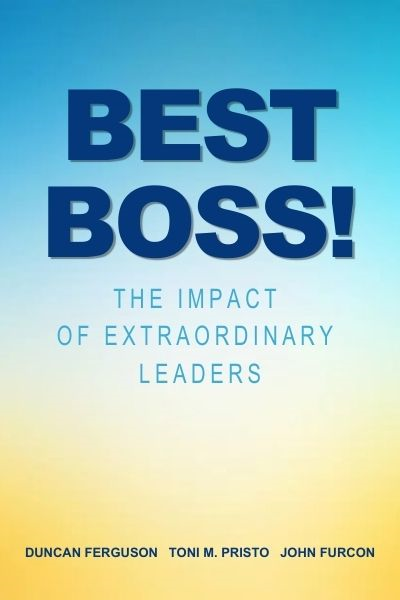“You made me a better person… not just a better leader. You made me learn how much more people can do when they feel supported and appreciated. You taught me to take chances, celebrate success, and appreciate that if I don’t make mistakes, I’m not challenging myself enough! Thank you!”
Have you ever worked for someone who made you feel this way? If so, you probably would call them your ‘best boss,’ and they likely have had a profound impact on your performance, your career, and even your life.
A few years back, two friends and colleagues of mine, Dr. Toni Pristo and John Furcon, and I decided to investigate the leadership magic of these inspiring individuals. We asked two straightforward yet provocative queries to a variety of people, including professional relationships, family, and friends:
- Who was your “Best Boss”?
- Why do you think so?
The study that followed these questions yielded profound insights in terms of who a Best Boss is, what they do, and the subsequent impact of such leadership. Much of what we have learned has been deciphered from the stories that came as a result of our research methodology. These anecdotes conveyed not only the behaviors and traits of respondents’ Best Bosses, but also the emotion elicited in working with that person. For some, the recollections were at times overwhelming—even in instances where decades had passed.
We learned that a ‘Best Boss’ inspired a level of commitment and conviction within employees that ensured they would consistently go beyond ordinary performance at work. What’s more, the effect of a Best Boss was often to create “leadership legacies,” generating a multiplier effect: great bosses beget great bosses.
Beyond that, we believe the most important effect of the Best Boss way of leading is the impact it can have on the human condition: by reducing the stress and demoralization of disengagement, by always encouraging respect and integrity, and by showing us through their interactions that each and every one of us matters, at work and in life.
Why a ‘Best Boss’ Matters More Than Ever
Over the past couple of years, we have shared our Best Boss study findings and insights in numerous forums with a wide range of people. The consistently enthusiastic reactions led to the just-released book, Best Boss! The Impact of Extraordinary Leaders.

The significance of a truly great boss is timeless—yet we find this leadership topic even more compelling in the context of the world in which we live today. As we continue to navigate COVID-19, it is increasingly obvious that leaders’ consideration of employee engagement and well-being remain more important than ever before—not just for the sake of retention, but for the people who comprise the identity of your organization.
In a recent article for Kincentric about the ‘post pandemic’ world of work, Dr. Seymour Adler noted that “In the era of COVID-19, leaders are, by and large, doing a great job showing caring and concern for their employees.” However, he goes on to warn that “after months of unprecedented kindness and care from their leaders, employees are now accustomed—indeed are starting to feel downright entitled—to more humane leadership. They simply will not tolerate a reversion to a command-and-control and all-business relationship with their managers.”
We agree with Dr. Adler’s assessment and hope that this book can contribute to a new era of values-based, compassionate leaders who drive results through people development. You can read an exclusive excerpt here:
From Chapter 5: ‘Activating Potential’
Leaders should, and indeed often are, expected to develop the skills and competencies of their people. So, as we analyzed our survey data, it was not a surprise to see development as the most-mentioned of the five Best Boss leadership dimensions. Yet, as we dug deeper, it became clear from our analysis that the dimension was far more robust than we initially imagined. Our study showed that Best Bosses activate potential by instinctively assuming everyone has unique capabilities. These leaders not only identify potential, but make it their mission to help the individual personally discover it, and then bring that potential to life in any way possible.
Both the Best Boss and the direct report play distinct yet equal roles if potential is to be successfully unleashed. Often it starts with a simple acknowledgement of respect toward the individual. As a bond based on mutual respect and trust develops, the Best Boss seeks opportunities to expose an individual to a variety of experiences that allows them to learn and grow. The Best Boss nurtures development with both constructive criticism and recognition to ensure lessons are being comprehended. And, perhaps most important of all, the Best Boss positively and consistently encourages the individual through every success and failure.
But this is only half of the activating potential process. The individual must take a risk—often by overcoming fear, uncertainty, or inertia—to advance their development. They have to believe in themselves as much as their Best Boss does. And, perhaps most importantly, they need to trust that their Best Boss will always support them, no matter the result.
Best Bosses exhibit four specific traits that help awaken potential. They are consistently challenging, supportive, trusting, and advocating in their leadership of others. The following survey quotes illustrate these traits:
- “I feel that George was not only advocating for me but kept pushing me to get better and better.”
- “Because of her support, I feel more confident in my skills and in the work I accomplish. I also feel better-prepared to handle challenging assignments and perform work that may be outside of my comfort zone.”
- “His encouragement and trust in me caused me to go above and beyond the expectations of the job. For that reason, I grew in ways that I never expected. My work was often difficult but always left me feeling accomplished and good about what I was doing.”
- “My Best Boss saw my gifts and moved me into positions that fit [them]…in a sense, he was an advocate for my best self.”
While activating potential presents itself in an individual’s performance and engagement, the long-term return on the activating potential investment can have positive implications that last well into one’s career. Call it the cumulative effect of discovering a capability that pays dividends throughout a working life.
We now turn the question to you: Who was your Best Boss? And why? Tell us in the comments below!
Best Boss! The Impact of Extraordinary Leaders is available on Amazon or at Business Expert Press.

